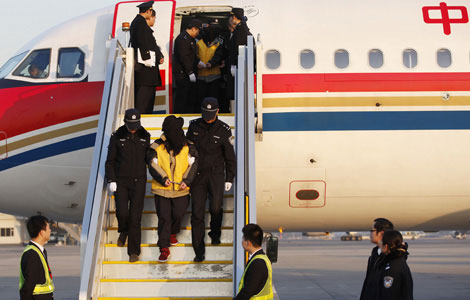China builds pilot free trade zone to further open up
Updated: 2013-09-26 02:17
By Miao Miao (Consulate-General of the People's Republic of China in New York)
|
||||||||
China's State Council has approved the establishment of a pilot free trade zone in Shanghai, according to a Ministry of Commerce statement. The general development plan is to be decided in mid-September and the zone will be formally set up by the end of September.
Covering 28.78 square kilometers, The Shanghai free trade zone will be built on the basis of existing bonded zones -- Waigaoqiao Free Trade Zone, Waigaoqiao Free Trade Logistics Park, Yangshan Free Trade Port Area and Pudong Airport Comprehensive Free Trade Zone.
The zone will be the first of its kind on the Chinese mainland. It will take about three years to build to meet international standards.
The pilot zone is a crucial move in adapting to global economic and trade development and imposing a more proactive opening-up strategy, said the statement, adding it will help explore a new path for China's opening up, speed up transformation of government functions and promote economic restructuring.
The zone will also help foster China's global competitiveness and serve as a new platform for the nation's cooperation with other countries, and contribute to efforts in building "an upgraded version of China's economy," said the statement.
Besides, China will adopt a "negative list" approach in the foreign investment management in the zone, and innovate the country's opening-up mode, said the statement.
Zhu Jianfang, chief economist at Citic Securities, said the "negative list" approach, which the zone will adopt, showed a thinking of power delegation.
"We can no longer rely on preferential policies to improve business and the investment environment. Rather, we should attract investment with highly efficient and transparent administrative services," said Zhang Youwen, an economic researcher at the Shanghai Academy of Social Sciences.
In the free trade zone, the reforms featuring power delegation will be deepened, and financial, business, cultural, education and medical services, which faced many restrictions before, are expected to enjoy more development opportunities, analysts said.
Experiments in the financial sector will be the most important part, such as the marketization of interest rates and exchange rate, and offshore finance, said Xu Quan, deputy head of the Shanghai Municipal Office of Finance Service.
Meanwhile, a State Council plan to suspend some laws governing foreign investment in the Shanghai pilot free trade zone will break new ground in China's investment management mechanism and boost foreign capital inflow, said analysts.
The aim is to cancel superfluous administrative procedures and make it easier for foreign firms to set up in the zone. The plan conflicts with some existing laws so the idea was mooted to simply suspend the problematic regulations.
"The free trade zone is not a special zone or new area. Its significance lies not in striving for preferential policies but in establishing a new system in line with international standards and realizing highly efficient management in sectors like investment and trade," said Zhou Zhenhua, director of the Shanghai Municipal Government Development Research Center.
China has rapidly grown into a global manufacturing power with its entry into the World Trade Organization, but the country remains relatively backward in service industries like financing, shipping, commerce, trade and culture, compared with developed nations, experts said.
Shanghai is leading the country in service industry development and the further opening up of the sector is the best choice for the city, according to Chen Bo, an economic and trade expert at Shanghai University of Finance and Economics.
As Shanghai was announced to build China's first free trade zone, more Chinese cities are planning to pilot free trade zone so as to enjoy the policy dividends.
Northern China's port city Tianjin is planning to set up a free trade port in its Dongjiang bonded port.
Aside from Tianjin, other cities, such as Guangzhou, Shenzhen, Chongqing, Xiamen, Qingdao, and Zhoushan, were also planning to apply for the establishment of free trade zones.
As for this momentum, experts suggest that the set up of any other free trade zone should follow scientific planning and rational overall arrangement, other than advancing too quickly.
Most Viewed
Editor's Picks

|

|

|

|

|

|
Today's Top News
Li Tianyi jailed for 10 years for gang rape
China reduces intervention and facilitates business
Xi promotes 'mass line' campaign
UN resolution on Syria's chemical weapons urged
Youth short on safe sex awareness
Death toll rises to 328 in SW Pakistan's quake
Trending news across China
China gaining market share in military drones
US Weekly

|

|













